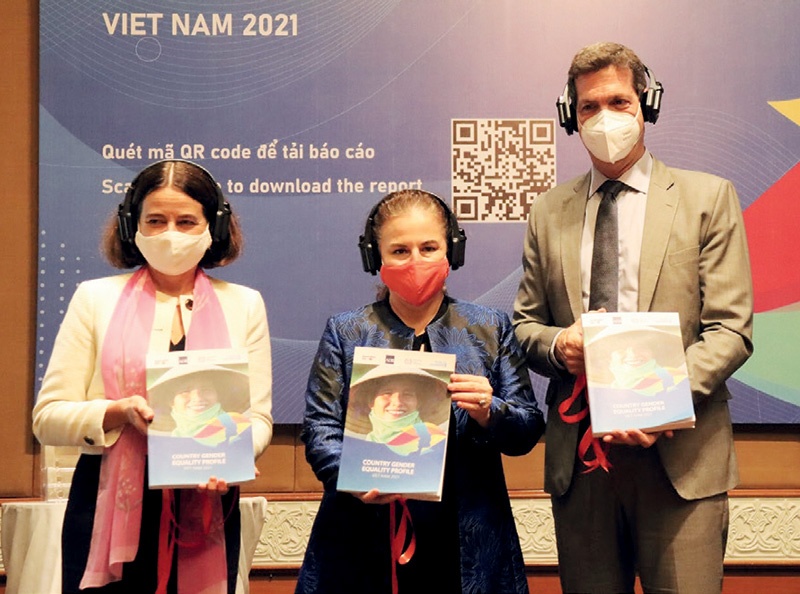Boosting national and regional capacity for women’s empowerment
 |
| Boosting national and regional capacity for women’s empowerment |
In Vietnam, we know that COVID-19 led to double the number of hotline calls and shelter admissions of women experiencing violence compared to the same period in 2019, and women healthcare workers, representing two-thirds of the health workforce, reported a high level of stress while maintaining their caregiving role at home and working on the frontlines.
For the first time in a decade, Vietnam saw a drop in the labour force participation rate of both men and women, particularly in some of the hardest-hit economic sectors such as tourism, hospitality, retail, and light manufacturing, which are female-intensive industries. And 70-90 per cent of women-led companies surveyed in Ho Chi Minh City reported that they had to downsize or close this summer.
As part of system-wide investments in this regard, and by leveraging UN Women’s triple mandate of normative support, coordination, and operational activities, UN Women Vietnam is committed to boosting national-level capacity and strengthening systems to monitor international, regional, and national commitments to gender equality and women’s empowerment.
At the global, regional, and national levels, UN Women has provided knowledge to close data gaps and broaden the scope of quantitative and qualitative analysis on the status of gender equality and women’s empowerment. The Country Gender Equality Profile (CGEP) is a joint effort of like-minded partners in Vietnam – UN Women, the Embassy of Australia, the Asian Development Bank, and the International Labour Organization in Vietnam.
These advancements have been serving as a baseline for Vietnam’s Second National Strategy on Gender Equality for the 2021-2030 phase, and as an interim report on the country’s progress in the Sustainable Development Goals (SDGs), with a focus on equality.
For the United Nations in Vietnam, the CGEP has been a useful source of information to facilitate gender mainstreaming in the preparation of the UN Sustainable Development Cooperation Framework for the 2022-2027 period.
I hope the CGEP will serve other development partners and stakeholders as a handy guideline to monitor SDG progress in Vietnam through a gender-responsive lens.
Given the timing of its development, the CGEP also serves as a reference to the progress of gender equality throughout past decades and gives recommendations and a way forward for promoting gender equality in Vietnam as part of the country’s socioeconomic recovery.
Since 2000, a national gender assessment has been produced for Vietnam every five years. This multi-agency effort is intended to provide a snapshot of the progress Vietnam has made towards gender equality as well as offers analysis and recommendations for addressing barriers to progress and closing gender gaps.
Each report has identified issues or disparities in every sector – ranging from governance, labour, agriculture, business, transport, and connectivity to urban development, family life, social protection, migration, and climate change. Based on these annual reports, gender equality acts as the core of true equality, sustainability, and the advancement of Vietnam’s socioeconomic development.
What the stars mean:
★ Poor ★ ★ Promising ★★★ Good ★★★★ Very good ★★★★★ Exceptional
Themes: Empowering Women
- Female influence still to be attained
- Shaping Vietnam's corporate future: female board members show business excellence
- Nestlé Vietnam contributes to elevating the role of women across the supply chain
- Empowering female leaders in tech: insights and aspirations shared at KPMG Tech Innovator 2023
- Brighter Path programme hosts empowerment meeting for ethnic minority girls
Related Contents
Latest News
More News
- Dong Ho folk painting added to UNESCO’s urgent safeguarding list (December 11, 2025 | 18:09)
- Conference focuses on switch from dog and cat meat trade to sustainable, safe jobs (December 11, 2025 | 12:13)
- 3F Plus clean pork amazes Michelin-starred chefs (December 09, 2025 | 12:15)
- The Rhythm of Blues – Colours of the Year 2026 (December 06, 2025 | 12:10)
- Pan Pacific Hanoi kicks off 2026 art awards celebrating young and disabled artists (November 06, 2025 | 18:25)
- PREP AI Language Fair 2025 highlights AI-powered language learning (November 03, 2025 | 09:00)
- Hanoi strengthens rabies control and supports transition of dog and cat meat trade (October 28, 2025 | 18:09)
- World-famous Gaia Earth installation touches down at UNIS Hanoi (October 07, 2025 | 13:40)
- Sidecar passion drives Vietnamese motor enthusiasts wild (September 05, 2025 | 09:00)
- Sheraton Saigon unveils artistic mooncake collection for 2025 (August 08, 2025 | 09:00)

 Tag:
Tag:


















 Mobile Version
Mobile Version